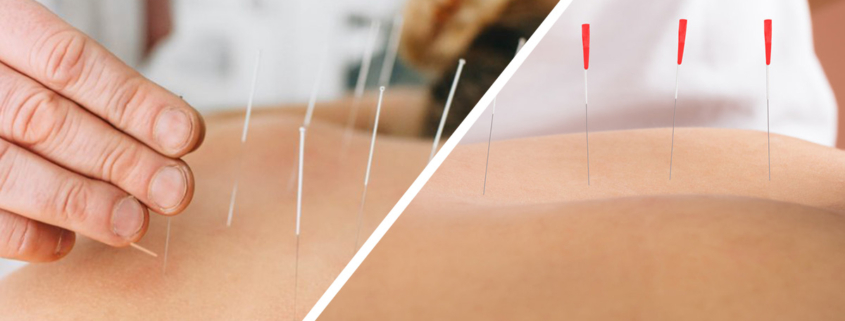Dry Needling vs. Acupuncture: Which is Best for Your Condition?
You might assume that dry needling and acupuncture are the same, but there are key differences between these needling techniques.
Each has its own purpose and conditions it can treat, so you need to understand dry needling vs. acupuncture options before seeking treatment from your healthcare provider.
Dry Needling Explained
Developed in the 1940s, dry needling treatment is a type of physical therapy derived from acupuncture that is designed to help treat chronic pain (namely muscle pain) and range of motion issues. Dry needling gets its name because no other substances are involved with needle insertion, whereas wet needling involves coated needles, which serve a different purpose to the patient.
How Does Dry Needling Work?
Dry needling uses very thin, sterile needles called “monofilament.” These stainless steel needles, also known as filiform needles, are much thinner than average needles and cause minimal (if any) pain or discomfort.
Trained and licensed DPTs (physical therapists) and chiropractors treat conditions by inserting needles into specific points on the body called “myofascial trigger points” that are primarily referred to as “muscle knots.” Muscle knots are points of increased muscle tension. Heightened stress can cause these trigger points to form due to highly irritable spots of muscle fibers.
Thin needles are inserted into these trigger points to alleviate the stress found in the muscle tissue, release endorphins, and provide pain relief. After needle insertion, the licensed practitioner then stimulates the affected area. Electrical stimulation, in addition to needle insertion, aids in providing pain relief.
Conditions Treated by Dry Needling
Dry needling treatment can help with numerous musculoskeletal conditions:
-
- Lower back pain
- Neck pain
- Fibromyalgia
- Headaches
- Migraines
- Osteoarthritis
- Repetitive muscle strains
- Sports injuries
- Tendonitis
Acupuncture Explained
Compared to Western medicine’s dry needling, acupuncture dates back several thousand years in Eastern civilizations. As a part of traditional Chinese medicine, acupuncture was designed to balance the flow of qi (pronounced “chee”), which was believed to flow through the body via pathways called “meridians.”
How Does Acupuncture Work
Placing acupuncture needles in trigger areas, which remain constant along the body’s meridians, allows the flow of energy to be restored. According to traditional Chinese medicine, it is believed that when the body’s energies are balanced, one experiences true physical, mental, and spiritual health. Should an imbalance occur, illness can arise (hence the need for acupuncture treatment).
Performed by licensed acupuncturists, solid monofilament needles are carefully inserted into the body. This is a method of returning the body’s energy to a balanced state by entering the acupuncture points where the flow is blocked or disrupted.
While the philosophy behind acupuncture is debatable, the results usually aren’t. Acupuncture stimulates the central nervous system for different effects on the body, such as pain relief or reducing anxiety. For thousands of years, acupuncture has been used to treat a wide variety of illnesses and ailments, and to great effect.
Acupuncture is a more comprehensive treatment than its alternatives, treating everything from musculoskeletal pain to mental ailments like depression and anxiety.
Conditions Treated by Acupuncture
Acupuncture treats a wide variety of conditions:
-
- Musculoskeletal pain
- Headaches
- Migraines
- Seasonal allergies
- Sleep issues
- Stress
- Depression
- Anxiety
- Osteoarthritis of the hip and knee
- Post-surgical pain
Key Differences Between Acupuncture and Dry Needling
While there are similarities between these two needling therapies, there are also differences in their functions.
Dry needling focuses on relieving soreness and discomfort by treating myofascial pain but does not do much beyond this. Although it is very effective at treating certain musculoskeletal conditions and can increase blood flow, it does not address mental health concerns or other physical ailments besides musculoskeletal issues.
Acupuncture, however, treats conditions that are not always musculoskeletal-related. Focused on the patient’s overall well-being, acupuncture has long been known for the variety of conditions it can treat. Acupuncture can even help reduce nausea in pregnant women or people receiving chemotherapy.
Another difference between practices is the needle’s placement in the patient’s body. Dry needling places needles into the point of muscular discomfort, i.e. the knot. Acupuncture places needles along the body’s meridians, regardless of where the discomfort is.
Lastly, unlike dry needling, acupuncture is typically covered by medical insurance.
Risks Associated With Needling Therapy
As with any kind of treatment, there are risks involved with needling treatments, albeit minor ones. Potential side effects, such as minor bleeding, bruising, or skin irritation, can occur.
Acupuncturists and physical therapists are highly trained and require licensing to practice in the U.S., which greatly reduces the risk of serious side effects. However, to get the most out of your appointment, there are some things you should avoid after acupuncture treatment, including strenuous exercise, applying lotion, or taking medications.
Do You Need Acupuncture or Dry Needling?
When it comes to the debate of dry needling vs. acupuncture, both can be effective treatment options, although acupuncture is the more versatile one. Before scheduling any kind of needling therapy, you should consult with your primary care physician. If you determine that acupuncture is the best option for your treatment plan, Meridian HealthCare is happy to help.
We have excellent patient care services, including acupuncture, to promote overall wellness. Our healthcare professionals work hard to make sure that you are taken care of in every way possible thanks to our integrative healthcare model. Reach out to us to schedule an appointment. When you’re ready, so are we.




